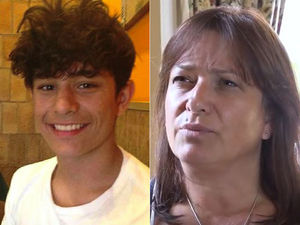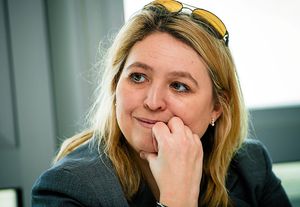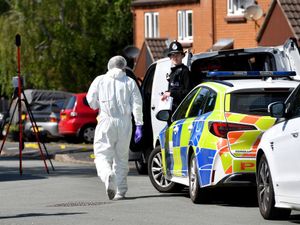West Mercia Police launch cyber bullying campaign - watch mum's heartbreaking video
Lucy Alexander knew something terrible had happened the moment she got a call from her son’s school saying that he had not turned up for his lessons.

“I felt in my gut something awful had happened.”
Her son Felix, 17, had been subjected to abuse on social media from the age of about 13, and had clearly been troubled by it. Mrs Alexander said: “He had been getting negative comments from people he knew, and people he didn’t know.
“He was called ‘black rat’ and ‘ugly’, people said he was worthless and everybody hated him. They didn’t understand or think through the consequences of what they said.”
As she went out with her husband looking for Felix, she noticed a policeman who was walking across a field near her home.
“He told me I should prepare for the worst. He had walked through a field and got under a train.”
Mrs Alexander has shared her story in a short film which is being released as part of a campaign against cyber bullying by West Mercia Police this week.
The force is also releasing two animated clips aimed at youngsters, advising them of what constitutes unacceptable online behaviour.
The campaign comes as the Government announced social media companies such as Facebook and Twitter could be made to pay for action to tackle the “undeniable suffering” the internet can cause, a government minister has announced.
Culture minister Karen Bradley says cyber-bullying, trolling and under-age access to pornography will be targeted in plans to make the online world safer.
Under the new proposals, social media companies will be hit by an industry-wide levy to fund measures to deal with online harm, although the charge will initially be paid on a voluntary basis.
The measures have received a cautious welcome from Sandra McNair, of the NSPCC in Shropshire, and the West Midlands.
While she is pleased the Government is launching a code of conduct for online service providers, she says she is concerned about how the scheme will be implemented.
“Social media companies are marking their own homework when it comes to keeping children safe, so a code of practice is definitely a step in the right direction but ‘how’ it is implemented will be crucial,” Mrs McNair said.
“However, there’s no doubt a lack of focus on children’s safety is a missed opportunity.
“Young people face a unique set of risks when using the internet and it is important any strategy recognises the challenges they face online and requires industry to act to protect them.”
Mrs Bradley, the MP for Staffordshire Moorlands, defended the decision to make the code of practice voluntary, despite a commitment in the Conservative Party manifesto to new legislation, saying there was still be the option to introduce new laws if it is proved necessary.

“I don’t rule out legislating if that’s what we need to do but I hope we can do it on a voluntary basis working with the companies,” said Mrs Bradley.
“It’s not backing away at all. It’s saying: ‘What is the best way to do this?’”
USEFUL LINKS:
Mrs Bradley said the Government was looking at whether social media companies should be classed as publishers rather than platforms.
Such a move could mean greater regulation of social media content.
Mrs Bradley added: “We are looking at their role and their responsibilities. And we are looking at what their status should be. They are not legally publishers at this stage, but we are looking at this issue.”
“That’s what we are looking at, as to how we can make sure that we do regulate the internet in an appropriate way.”
She said the opportunities of the internet need to be embraced, adding: “But we have to do it in a safe way, and we have to do it in a way that respects content as much as anything else and that’s one of the issues about the status of internet companies and social media companies.”
The proposals outlined in the Internet Safety Green Paper also include an annual internet safety transparency report to keep tabs on online abuse.
Support will be given to digital start-ups to make sure they build safety features into new apps.
The Government also confirmed plans announced earlier this year to include online safety as part of compulsory lessons in schools.
It highlights research from the UK Safer Internet Centre that found 64 per cent of 13 to 17-year-olds have seen people posting offensive images or videos.
But opposition parties are calling for more detail and stronger policy.
Shadow culture secretary and Labour deputy leader Tom Watson said: “We’re pleased the Government has accepted Labour’s call for compulsory sex and relationship education in schools, including online safety education, as well as for codes of practice for social media companies to prevent abuse.
“But this announcement is short on detail. The Government needs to say more about who exactly will pay the proposed levy, how much they will pay and how it will be spent.”
“They need to explain what transparency information they will be asking social media companies to provide.”
Liberal Democrat home affairs spokesman Sir Ed Davey said: “The substance in this Green Paper falls far short of its ambitious title. We must make the internet a much safer place, particularly for young people. That means the hard graft of better digital education, faster reporting of problems and stronger partnerships with industry.”
“Regrettably, this Government is still in the blame game, scapegoating and castigating internet firms, and failing to see the huge economic benefits of investing in better digital education.
“Hopefully this Green Paper will be the last of the weak policy reheats and signal the start of real hard work on this issue.”
Facebook says it welcomes “close collaboration between industry, experts and government to address this important issue”. A spokeswoman said: “Our priority is to make Facebook a safe place for people of all ages, which is why we have spent a long time working with safety experts like the UK Safer Internet Centre, developing powerful tools to help people have a positive experience on Facebook.”
A spokeswoman for Instagram says: “The safety of our community is our main priority. We work in partnership with experts to develop features and resources to help people have a positive experience on Instagram.
“We will continue to work in collaboration with other organisations in our industry, and government, to keep the Instagram community safe.”
West Mercia Police is targeting youngsters with its campaign, hoping it will make them more likely to report any untoward behaviour they witness against their peers.
Chief Supt Mark Travis, who is heading the campaign, says: “Together, we must try to prick the consciences of bullies and make them aware that their actions can have serious consequences.
“We must also make information and support as widely available as possible so that people experiencing or witnessing bullying know where to turn for help.”
The campaign has also been backed by actress Elizabeth Hurley, who is friends with Bridgnorth landowners William Cash and his wife Lady Laura Cathcart.
Mrs Anderson says it is crucial that parents talk with their children so that they know about what they are doing online.
“From the moment you give your child a phone you need to have a conversation with them, so you know all the time what they are doing, who they are doing it with, and what platforms they are using,” she says.
“Let them help you understand how they function.”





